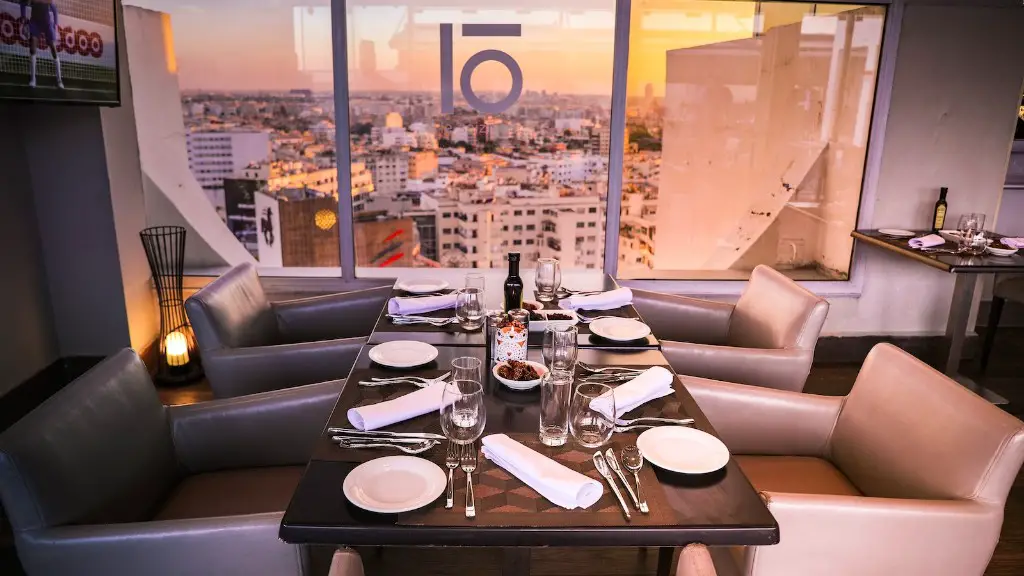You can open your own franchise restaurant by following these simple steps. First, find a franchisor that you want to work with. There are many different franchisors out there, so take your time and find one that is a good fit for you. Then, follow the franchisor’s guidelines for opening your restaurant. This may include things like completing training programs and meeting certain standards. Once you have opened your restaurant, be sure to provide excellent customer service and follow the franchisor’s guidelines for running your business. With hard work and dedication, you can be successful in opening your own franchise restaurant.
1. Research the franchisor to be sure it’s a good fit for you.
2. Draft a business plan.
3. Find financing.
4. Purchase the franchise license and any other required materials.
5. Complete the training program provided by the franchisor.
6. Find a location and build or renovate your restaurant according to the franchisor’s specifications.
7. Staff your restaurant.
8. Promote your restaurant.
How much money do you need to open a franchise restaurant?
If you’re looking to buy a franchise, be aware that startup costs can range widely – from $50,000 to $6 million. Most franchise restaurant startups fall into the $200,000 to $300,000 range, though some franchisors require unborrowed funds and a minimum net worth for approval. Keep this in mind as you explore franchise opportunities and make sure you have the necessary capital on hand to make your dream a reality.
A franchise disclosure document (FDD) is a legal document that is required by the Federal Trade Commission (FTC) in order for a franchisor to offer or sell franchises. The FDD must be delivered to a prospective franchisee at least 14 days before the franchisee signs any contract or pays any money to the franchisor.
A franchise operations manual is a document that contains the franchisor’s standards and procedures for operating a franchised business. The manual is typically provided to franchisees after they have signed a franchise agreement.
Intellectual property (IP) refers to the creations of the mind, such as inventions, literary and artistic works, and symbols, names, and images used in commerce. Franchisors need to protect their IP in order to maintain their brand identity and to prevent others from unfairly profiting from their work.
When establishing a new franchising company, there are a number of important considerations, such as choosing the right business structure, obtaining the necessary licenses and permits, and raising capital.
The final step in developing a franchising company is to create a franchise sales strategy. This involves developing a marketing plan and identifying potential franchisees. The goal is to generate interest in the franchise and to attract
Is owning a restaurant franchise profitable
If you’re considering owning a food franchise, it’s important to do your research and be realistic about the potential profits. While it’s possible to make a lot of money owning a food franchise, the majority of owners earn much less than they expected.
A multi-unit franchise is where a franchisor grants a franchisee rights to open and operate multiple franchise units. This is generally seen as a higher-level franchise agreement as it requires a greater investment from the franchisee.
An area development franchise is where a franchisor grants a franchisee rights to open and operate multiple franchise units in a specific geographic area. This is generally seen as a higher-level franchise agreement as it requires a greater investment from the franchisee.
A master franchising agreement is the highest level of franchise agreement. This is where a franchisor grants a franchisee rights to open and operate multiple franchise units in a specific geographic area as well as the right to sub-franchise the units to other franchisees. This is generally seen as a higher-level franchise agreement as it requires a greater investment from the franchisee.
How often do you pay a franchise fee?
Monthly franchise royalties are typically collected by your franchisor as a percentage of your revenue. These fees help cover the costs of ongoing support and marketing for your franchise.
There are a few things to keep in mind before buying a franchise. First, while the initial investment might not be too high, the royalties and fees associated with the franchise can quickly cut into profit margins. Second, the majority of franchise owners earn less than $50,000 per year, so it’s important to have realistic expectations about the potential income from a franchise. Finally, remember that a franchise is a long-term investment, so be sure to do your research and choose a franchise that you’re passionate about.
Can you make a living owning a restaurant?
Yes, restaurants are profitable, but they have low profit margins. Profitability depends on many factors including the size and type of restaurant, as well as economic ones. It takes an average of two years for a new restaurant to turn a profit.
The key question you need to ask yourself is whether you want to be in complete control of your restaurant business or if you are willing to give up some control in exchange for help with branding, marketing and financing. If you are the type of person who likes to be in complete control, then starting your own restaurant is probably the better option. However, if you are willing to give up some control in exchange for help with branding, marketing and financing, then franchising may be the better option.
Do you need a Licence to run a restaurant
If you plan on opening a restaurant or any other business related to food, you must first register with your local authority. Registration is free and cannot be refused, but it must be done at least 28 days before the restaurant opens. This will ensure that your business is up to code and compliant with all local regulations.
In the event that a franchisor’s business is sold off, the franchisor’s assets include the brand and franchise agreements. However, franchisees may argue that their franchise agreement has ended and that they are no longer bound by any obligations.
Do small restaurant owners make money?
It is difficult to pinpoint an exact salary range for restaurant owners, as it can vary greatly depending on factors such as the location and size of the restaurant, as well as the owner’s experience and business acumen. However, according to Payscale.com and Chron.com, restaurant owners can make anywhere from $31,000 to $155,000 per year, with the national average being around $65,000. Therefore, if you are considering becoming a restaurant owner, it is important to be aware that there is a wide range of potential salaries, and to do your research to ensure that you are realistic about your earnings potential.
There are a number of reasons for this. First, fast food franchises have very low overhead costs. They don’t need to spend money on expensive office space or inventory. Second, fast food franchises have a high turnover rate, so they’re constantly bringing in new customers. Finally, fast food franchises have a built-in marketing strategy: they’re always advertising on TV and radio, and their locations are often highly visible.
What are 4 disadvantages of a franchise
Franchising can be a great way to get started in business, but there are a few potential disadvantages to consider. One is that you may have limited creative opportunities, as the franchisor may have strict guidelines for how you operate your business. Another potential downside is that you may have to share financial information with the franchisor, which could be a concern if you’re worried about confidentiality. Additionally, Franchises can vary in the level of support they offer, so you may not always have access to the resources you need. Finally, while initial investments and start-up costs can be expensive, keep in mind that contracts with franchisors aren’t always permanent, so you may not have the security you’re looking for. Ultimately, franchising can be a great option, but be sure to do your research and weigh the pros and cons before making a decision.
Franchises can be a great way to get into the business world with a proven model and strong support from the parent company. When choosing a franchise, it is important to consider the initial investment, the ongoing costs, the potential for growth, and the brand recognition. Some of the most profitable franchises include Anytime Fitness, McDonald’s, UPS Store, Jersey Mike’s Subs, Dunkin’, Sport Clips, 7-Eleven, Papa John’s.
What are 5 keys to success in owning a franchise?
If you’re motivated to own your own business, a franchise can be a great option. When you buy a franchise, you’re buying into a proven business model and benefit from the support of the franchisor. To be successful, you’ll need to follow the Franchisor’s system and be open to feedback and support from your team. It’s also important to avoid burnout by delegationg tasks and maintaining a healthy work/life balance. Lastly, as a franchise owner you should become an active and valuable member of your community.
The amount of money that an entrepreneur needs to finance a franchise transfer typically depends on the down payment requirements of the franchisor. For example, if a franchisor requires a 20% down payment, then an entrepreneur looking to finance a franchise transfer would need to put down 20% of the total cost of the franchise. However, if a franchisor requires a 25 – 30% down payment for a new location or start-up business, then an entrepreneur would need to put down that much money upfront.
Do franchises pay taxes
Franchise taxes are an additional tax that organizations must pay in addition to federal and state income taxes. The amount of franchise tax can differ greatly depending on the tax rules within each state. Kansas, Missouri, Pennsylvania, and West Virginia have all discontinued their corporate franchise taxes.
If you’re looking for a business model that doesn’t require your full-time attention, a franchise may be a good option. Franchises can be set up as “semi-absentee” businesses, which means the owner doesn’t need to be involved in the day-to-day operations. This can be a good way to continue working for another company or enjoy more free time for hobbies and family.
Final Words
There is no one-size-fits-all answer to this question, as the best way to open a franchise restaurant depends on the specific business and location. However, there are some general tips that can help guide you through the process:
1. Do your research. Thoroughly investigate the franchisor, the business model, and the competition. Make sure you have a clear understanding of what you’re getting into before making any commitments.
2. Choose a location wisely. Consider the demographics of the area and the foot traffic in the vicinity. You want to make sure your restaurant will be visible and accessible to potential customers.
3. Create a detailed business plan. This document should outline your goals, strategies, and financial projections. Having a solid plan in place will make it easier to secure financing and attract potential franchisees.
4. Build a strong team. Assemble a group of experienced professionals who can help you launch and operate your franchise restaurant successfully.
5. Promote your business. Develop a marketing plan to generate buzz and attract customers to your new restaurant.
Following these tips will increase your chances of opening a successful franchise restaurant. Remember to consult with an experienced franchise lawyer to ensure you are in compliance
For those looking to start their own business, franchising a restaurant can be a great option. There are many well-known franchise brands to choose from as well as some up-and-coming ones. The key to success with a franchise restaurant is doing your homework to choose the right brand and location, and then following the franchisor’s guidelines to a T. With hard work and dedication, you can be on your way to owning a successful franchise restaurant of your own.




